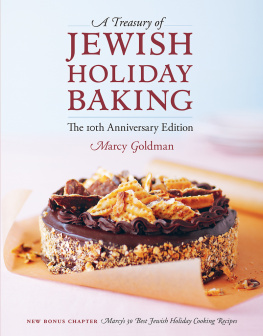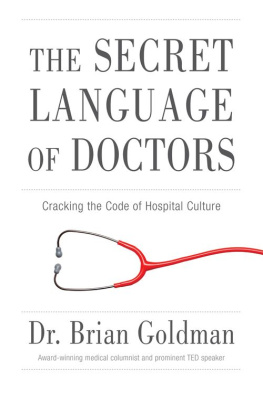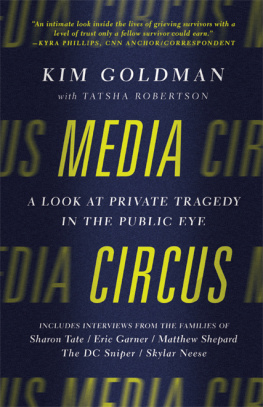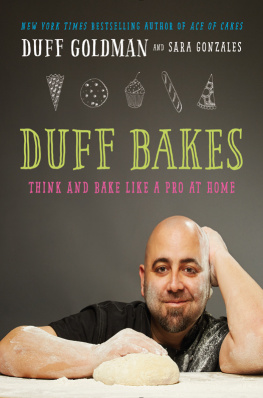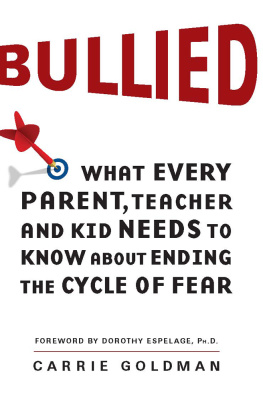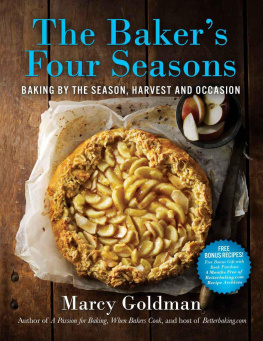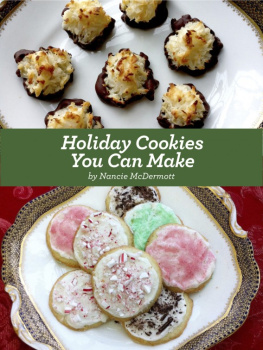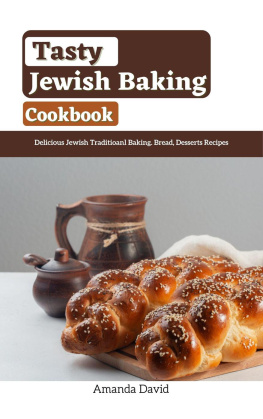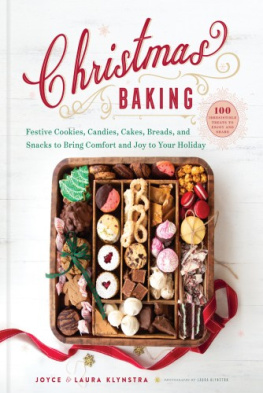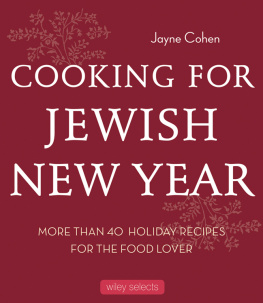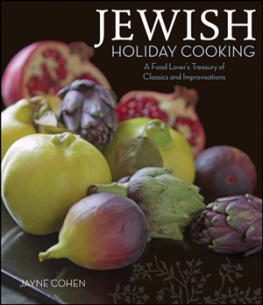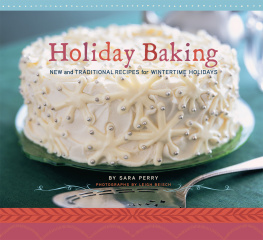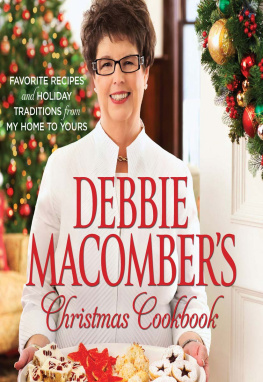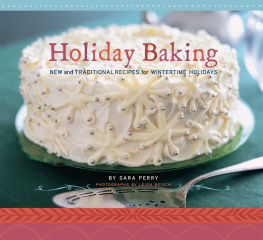Acknowledgments
I am often asked the same questions about my recipes. One is, do you make up your own recipes? In most cases, yes. I have more than a hunch about what makes a recipe correct: it should be technically balanced, authentic from both a historical and culinary point of view, and easy for someone else to reproduce. Another question I am asked is if the recipes work. A strange question, but one I am asked frequently nonetheless. Again, the answer is yes. First of all, I test recipes many times, refining and modifying them so that someone else will have success with them, and trying to make it as easy as possible to achieve this. For newspaper- and magazine-feature work, this is particularly important, for once a recipe hits the (usually) Wednesday food section and people run out to get ingredients, you just cannot have any doubt about a recipes worthiness. It is unethical to waste peoples time and money with improperly tested recipes. Readers loathe being fooledand who can blame them? It is in a food writers best interest to care about his or her work, for nothing invalidates you more quickly than a reputation for recipes that do not turn out. Some newspapers, fortunately, have test kitchens (all food magazines have them) and that is another insurance policy.
For a cookbook, the task of recipe testing is even more important. Number one, there is no backup test kitchen to confirm your efforts. Secondly, unlike a newspaper that can print recipe corrections (a dreaded but practical reality), a cookbook cannot alter an error until the next printing. So, recipes really have to be tested by others who have a discerning eye and palate. Where to find these benevolent test bakers?
When I first started putting this cookbook together, I would create and test recipes and deliver samples of finished prototypes to friends. Little white confectioners bags containing samples of honey cake, fluden, strudel, mandelbrot, et cetera would be left on door knobs, exchanged at carpool, or hand-delivered to any friend or acquaintance I might meet in the course of my day. Try this, try that, I would implore. Should it go in the book? What do you think? More sugar? Less vanilla? Add some chocolate, increase the apples? Would you make this for Shabbat or for Rosh Hashanah? Would you add raisins or not? Should it be a nine- by thirteen-inch pan or a ten-inch springform?
When you bake around the clock, you can lose your sense of taste. Letting friends sample the recipes restored some of my perspective. Eventually, as time marched on, the do-you-think-it-should-go-in-the-book refrain became a plea for help. I was determined to get the whole book retested inside out and trouble-free. As the deadline for the manuscript drew even closer, this goal became overwhelming. Sensing a drowning baker in their midst, friends stepped in.
With each persons help and interest, I was rescued from my writer/baker vacuum. Volunteer testers made short work of a task that had seemed insurmountable. They set about retesting recipes immediately, comparing my baking times with theirs, as well as confirming pan sizes, methods, ingredients, and directions. Copies of recipes flew back and forth (left in nursery school cubby boxes, as well as faxed and emailed to and fro) as the huge task got distributed among several capable pairs of hands and kitchens. My phone began ringing as questions arose: You never said what temperature. You left out the second half of the directions for the strudel! My oven baked it in less time than yours. Can I use a tube pan instead of an angel cake pan? You called for lemon zest but dont say in the recipe where it goes! And so on and so forth. One day, one tester casually said to me, You know, no matter how perfect you intend to make it, everyone bakes in different ways, ovens are different, eggs are different, personal methods varyyou can make yourself crazy over this! True enough, but I was (and am) determined that in this era of nonbakers, anyone using this book should find success.
Having other people bake them meant they were checked for errors and stripped of ambiguityall because of the efforts of this special bakers task force. It was also a good way of gauging if something was too hard, or an ingredient too uncommon to bother with, or if a recipe was less than stellar. Since everyone has different mixers, ovens, and baking pans, the unofficial test-bake team offered insights into how well recipes worked out in a variety of conditions. If these recipes are easy, trouble-free, and failure-proof, and taste wonderful, much of the thanks belongs to these women.
The Bakers Test Kitchen
Mona Abrams
Linda Beck Sidel (Test Kitchen Manager, 1st edition)
Cheryl Birenbaum
Heidi Cooney
Mayda Dubman
Rebecca Freedman
Ellen Fuss (Test Kitchen Manager, current edition)
Ellen Gold
Janet Goldstein
Ann Harste
Christian Hudon
Yvan Huneault (BBs Original Webmaster)
Heather Ingberg
Regina Joskow
Cynthia Kerr
Barbara Kling
Whynter Lamarre
Leone Lamb
Laurie Rosenthal
Wendy Sefarty
Amy Stromberg
Id also like to thank the team at Whitecap Books: Robert McCullough, a true gentleman of publishing and in every other sense of the word; editor Taryn Boyd, art director Michelle Mayne, and designer Diane Yee, for their unerring taste in words and aesthetics, and a love of cookbooks to match their talents; Jan Westendorp, for her courtesies in all ways; and to photographer Ryan Szulc and prop stylist Madeleine Johari, for making the recipes come to life. To all at Whitecap, my thanks is above all reserved for the incredible welcome and for the experience of sheer joy in creating this special book.
Writers can write all they want to but it just doesnt mean as much unless your words get published. An editor has to give you the go-ahead green lightthat is, accept your work. I have been fortunate to have contributed to many well-respected newspapers and magazines in the United States and Canada. This has given me the best possible training (aside from my training as a pastry chef and baker) to become a cookbook author. Several editors have been very helpful at different points in my career, validating my work by publishing my byline in their pages, allowing me to share my passions as a baker and a writer with their readers. My thanks to Atlanta-Journal Constitution, Baltimore Morning Sun, Bon Apptit, Boston Globe, Buffalo News, Canadian Living, Chicago Tribune, Chocolatier, Cleveland Plain Dealer, Cooks Illustrated, Detroit Free Press, Eating Well, Fine Cooking, Food and Wine, Newsday, New York Times, Ft. Lauderdale News and Sun Sentinel, King Arthurs Baking Sheet, London Free Press, Miami Herald, Montreal Gazette, Oregonian, Ottawa Citizen, Pastry Art and Design, San Diego Union, Sacramento Bee, Toronto Star, Toronto Sun, Vancouver Sun, and in particular, to the readers of the Montreal Gazette (my home paper) and the Washington Post (my adopted home paper). Also, thank you to CBC Radio, Martha Stewart Living Radio (on Sirius), and every radio station throughout the U.S. and Canada that has hosted my chats over the years on Jewish holiday baking.
Thanks to the folks at Boyajian, King Arthur Flour, Nordic Ware, Penzeys Spice House, and the White Lily flour company. Thank you to Brian Maynard of KitchenAid and Matt Nielsen of Nielsen-Massey Vanillas.
Thank you to Paul MacKenzie of Elehost Web Design (www.elehost.com) in Toronto for web support that goes above and beyond the call of duty. There is no one more professional, humane, human, nor as software- (and hardware-) savvy as you.
Thank you to Susan Ginsberg for bringing me to Doubleday, and to editor Judith Kern who first painstakingly went through mounds of very raw manuscript and an Old Testaments worth of Jewish holiday recipes.

